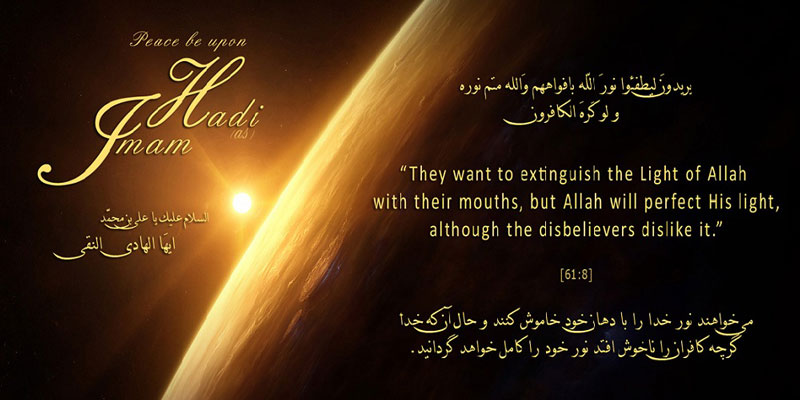It is a brief outline of the sayings of the tenth infallible Imam Hadi (A) concerning moral values.

The tenth of twelve infallible Imams, after the Prophet Mohammad (P), Ali ibn Muhammad ibn Alī commonly called Ali al-Hadi and Alī an-Naqī, was born in Medina 5th Rajab 214 Hijri ( 8.9.829 AD), and martyred in Samarra, Iraq 3rd Rajab 254 Hijri (1.7.868). [1] On the occasion of his martyrdom we are going to study some of his meaningful hadiths and sayings.
Imam Hadi (A) was one of the great teachers of all Muslims, during his lifetime, that is why he remained in Medina teaching them until the age of 30 when he was summoned to Samarra by the Abbasid caliph Al-Mutawakkil. There he was treated roughly by the caliph and his successors until, according to Shiite accounts, he was poisoned through intrigue of Al-Mu'tazz the Abbasid caliph, in 254/868, and was buried in Samarra. [2]
Imam Hadi (A), in one of his hadiths emphasizes the importance of deed in Islamic teachings saying that "People are respected in this world for possessing wealth and in the Hereafter for possessing righteous deeds." [3] The tenth infallible Imam after the prophet Mohammad (P) tells his followers that they must be very much careful about their deeds; because, according to him in the hereafter life nothing could help them except for their good deeds.
The narration quoted from imam Hadi (A) shows that Islam is a religion in which practice and deed is important that is why no one should think that for example their ethnic or racial relation to the prophet could help them in the hereafter life. Imam Hadi (A) is also of the view that bad deeds will have its impact on the soul of men. He says "Arrogance is an obstacle of obtaining knowledge and diverts man towards ignorance and humiliation." [4]
Notes:
[1] See: Tabatabai, Sayyid Muhammad Husayn (1997). Shi'ite Islam, Translated by Seyyed Hossein Nasr, SUNY press. pp. 183–184. And Momen, Moojan(1985), an Introduction to Shi'i Islam, Yale University Press, pp. 43–44.
[2] ibid.
[3] Behar al-Anwar v78, p 368. اَلنّاسُ فی الدُّنْیا بِالأَمْوالِ وَفی الآخِرَة بالأَعْمال
[4] Behar al-Anwar v69, p 199. الْعُجْبُ صَارِفٌ عَنْ طَلَبِ الْعِلْمِ، دَاعٍ إلیَ الْغَمْطِ وَ الْجَهْل



